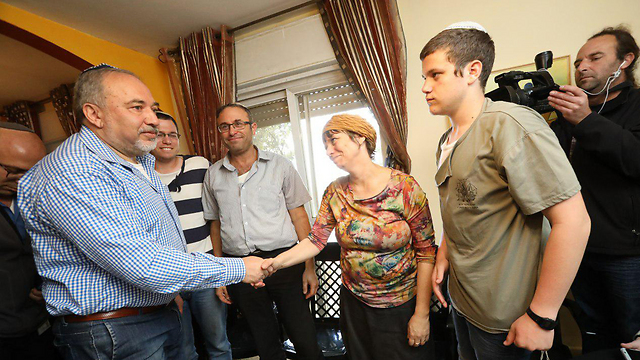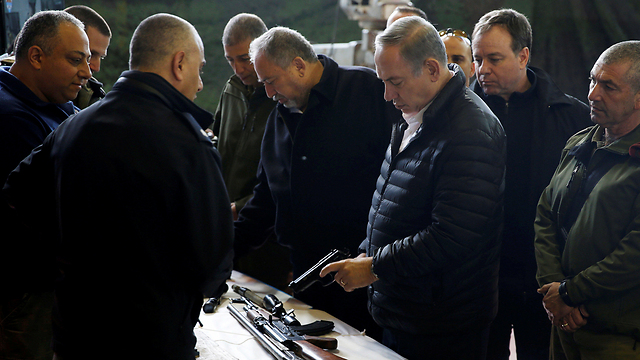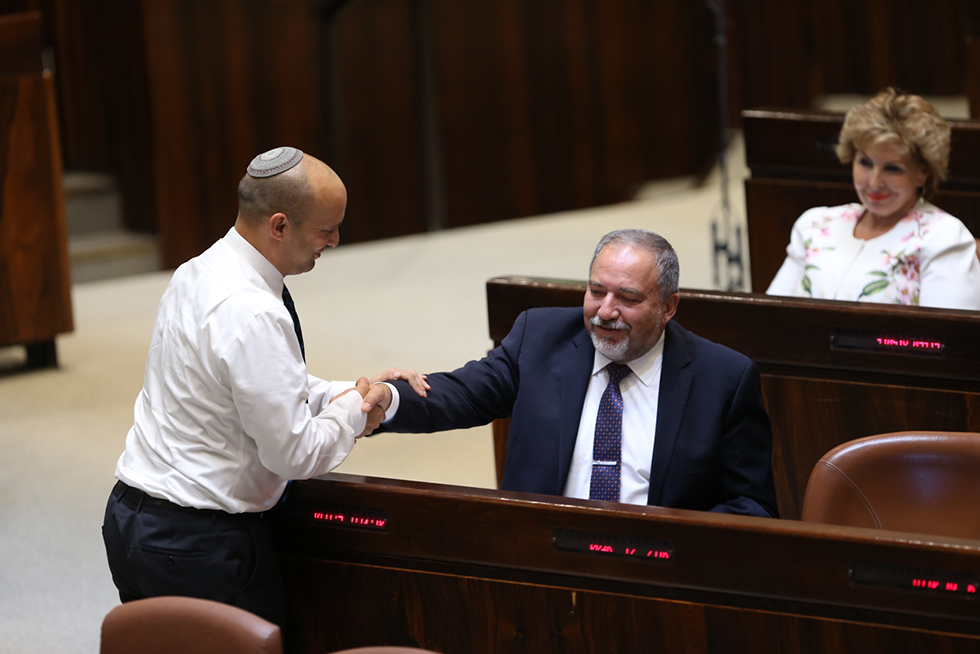
Right to the center: The complex placidness of Min. Lieberman
Avigdor Lieberman is calm. Perhaps it’s the spring, but his tough character has softened since he became minister of defense. And so while he still threatens Hamas, he is not looking for unnecessary excursions in Gaza. And after all the harsh things he said about Netanyahu and the government, he is pleased with both, except for Naftali Bennett.
Ten months after taking the job of Minister of Defense, Avigdor Lieberman looks at the Gaza Strip more realistically. The man who threatened to topple the Hamas government and assassinate Ismail Haniyeh knows that the landscape is more complex.
In other words, what you see from the visitors chair is not the same as what you see from the defense minister's chair.
"I am 100% certain that the barbaric chemical attack was carried out by the Assad regime and on his direct orders and planning," said Lieberman during a special holiday interview.
In the meantime, Lieberman's statements were granted credence in the field by the American cruise missile response.
"The American attack was an important, necessary and moral message that the free world will not tolerate the war crimes against innocent civilians of the regime of terror that Assad heads. The update the Americans gave to the IDF and security establishment before the attack is further proof of the deep relationship between Israel and her greatest ally, the United States," said Lieberman.
What is the message in the ongoing massacre in Syria?
"That Israel can rely on itself. Assad tried to obtain nuclear weapons in the past and Hezbollah is no different. People ask why there is no peace in the Middle East? It's like asking whether a cannibal can become a vegetarian. The word 'peace' is not relevant. There can be a diplomatic arrangement, not peace," said Lieberman.
In the months since becoming minister of defense, Lieberman has replaced his well-publicized and belligerent declarations with demonstrative statecraft.
After visiting Sderot, Lieberman put the responsibility for the assassination of Mazan Fukha on Hamas. For someone who once threatened the assassination of terrorists in Gaza, he now gives credit for the hit to Hamas.
Even during this interview, Lieberman insists that he only heard about the assassination for the first time on the news.
"From my knowledge on the system there and the man leading that system (Yahya Sinwar), it looks like an internal issue. It is a characteristic of terrorist organizations."
Can you tell us that Israel really wasn't involved in the assassination?
"We can say for sure that this was an internal assassination."
Referring to his previous assertion of characteristics of terrorist organizations like Hamas, Lieberman said, "I wouldn't be surprised if someone assassinated the president of Iran during their May 19 elections."
New Policy
While there haven't been any assassinations, in the meantime, Lieberman has declared that since his appointment as defense minister, there has been a change in Israeli policy regarding the volatile borders.
"When I came into the defense ministry I said that we were taking another pattern of response," said Lieberman. "We have no intention of initiating an operation in the south or the north, but I have no intention of taking provocations or errant fire. For any shot fired at us, there will be a strong response."
Are you claiming that this was not the policy of your predecessor, Moshe Ya'alon?
"No. There just wasn't a strong response. It was always tit-for-tat. There has been a fundamental change and it is working well. If I take the second half of 2016, it was the quietest six months in Gaza since 1967."
Is that not a dangerous game in a time of quiet?
"There is no such thing as quiet. Gaza-area residents are not suffering from Israel, they're suffering from Hamas policy."
"We do not want to cause a humanitarian crisis, but we will not take our money and invest in electricity and water facilities for them. That is why I strongly oppose the construction of a seaport in Gaza. That's exactly what they want: to lift the siege and get a port that we won't be able to control. If Hamas gives up on its tunnels and rockets, I'll even build an industrial zone at the Erez Crossing, as well as a port."
The defense minister's eyes are currently looking to the summer. True, the Gaza Strip is not as much of a strategic threat compared to Israel's northern front, but everything is more explosive there. The slightest hint of a Qassam being fired at Israel or a powerful response by Israel could lead to an escalation. The construction of a barrier along the Gaza Strip border against the tunnels is due to begin in July, and it is quite possible that Hamas will act to prevent its construction. "The ball is in their court," says the Lieberman. "If they want war, they will be sorry, it will not be a return to the days of Protective Edge, we will mobilize the entire army and move forward with all our might."
Lieberman begins to lose his cool when we state that such a battle will be a heavy price. "Listen, this isn't a matter of price," he interjects. "A state cannot embark on an operation every two years. (If a new operation in Gaza begins—ed), it will be something completely different, both in the intensity of the fire and in our ability to strike at a much higher level. We have to reach a point where anyone forcing us into war will come to regret it. We can't blink. We won't leave a stone in place."
This brings us back to the election of you and Netanyahu from 2009, to topple the Hamas regime. It did not work then, why should we believe you now?
"People see how the IDF has been operating in the past 10 months both in the North and South. Everyone understands this equation, and I hope this is mainly understood on the other side."
It seems to bother you, when you are reminded of the 48 hours to eliminate (Hamas leader—ed) Haniyeh.
"It doesn't bother me; let's talk at the end of my time in office."
Was your promising to take out Haniyeh a mistake? Was it the result of a short temper?
"You'll notice," says Lieberman facetiously. "that I've had surgery to make my temper last longer, and it's worked."

Despite the vehicular terrorist attack on Thursday, in which Sgt. Elchai Teharlev was killed, Lieberman believes that the wave of terror in Judea and Samaria is behind us. According to him, the relatively good economic situation in West Bank cities is pushing terrorism to the margins. "When you compare the standard of living in Judea and Samaria to Gaza, you see the differences. The population in Judea and Samaria does not want a wave of terror attacks, and when you examine every terrorist and look into their backgrounds, you discover that most of them have personal problems. There's also been an improvement in the effectiveness of our security measures."
While Lieberman is quick to use the stick, he sets almost unreal conditions for the carrot. He rules out any political incentive, including negotiations, and is unwilling to place any responsibility on Israel for the ongoing failure of the talks. "The political deadlock is first and foremost because of the Palestinians," he says. "There were other prime ministers here. Why didn't the Palestinians succeed in reaching an agreement with Ehud Barak? Arafat sat down with him at Camp David, they sat down with Arik Sharon, they sat down with Tzipi Livni and Ehud Olmert in Annapolis. Is Tzipi Livni anti-peace? What Olmert offered them at Annapolis hadn't been offered by any other prime minister. What matters now is to improve the economic situation in Judea and Samaria as much as possible."
On one issue, at least, Lieberman is unwilling to reconsider things à-la "the things you see from there, you cannot see from here": his 2004 plan to exchange territories and populations. "I'm talking in every international forum about land swaps and no one has fallen off the chair," he says. "On the contrary, they ask me questions and ask for details. We do not understand why all the members of the Joint List do not sit in the (Palestinian—ed) parliament in Ramallah."
Israel's official position is that minorities fully enjoy equal rights here.
"When it comes to Israeli Arabs, we had the wrong approach. Look at their pet leader, (Joint List Leader—ed) Ayman Odeh, since he took office: He refused to sign a surplus agreement with Meretz because it's a Zionist party; he did not agree to come to the funeral of Shimon Peres, whom he called a murderer; they admonished the Arab League after they put Hezbollah on their list of terrorist organizations. My view is consistent: it is within our interests to separate from the Palestinians, and we can no longer work in accordance to a land-for-peace plan. What will work is a land and population swap. A national minority of less than 10 percent is loyal, while a national minority of more than 20 percent becomes oppositional. They want to establish a Palestinian state in Judea and Samaria without a single Jew, while turning Israel into a bi-national state. "
You refuse to acknowledge Abu Mazen. So who should we talk to?
"I don't want to impose a leader on them and I don't want to anoint kings. There are enough realistic people there, I meet with Palestinians nearly every week, and there is a fruitful dialogue between us. They understand that Abu Mazen has not lead them anywhere."
Out of the in crowd
In the past few weeks, the issue of women fighting in the IDF has been once again in the headlines, as Yigal Levinstein, the rabbi of the pre-army preparatory program in the settlement of Eli, led the government to silence him until Lieberman called him twice to order, before finally summoning him to a hearing, Avichai Mandelblit, forbade him to hold the hearing "because of lack of authority.""The problem is that the National Religious Party (NRP—ed) becomes the ultra-Orthodox, and Bayit Yehudi builds a bi-national homeland for us," Lieberman says, attacking his coalition partners. "Every day they have a new false prophet who comes with prophecy and sells us hallucinations." Look at Rabbi Levinstein: We forgave him twice, but he went back to attacking women in the IDF. What kind of thing is this? I look at my settlement, Nokdim. My daughter went Bnei Akiva there, with boys and girls. These days, I see that the boys and girls are separated from one another. "
And what about Haredi violence against IDF Haredi soldiers?
"This is not normal, a radical and anti-Zionist faction that is still receiving budgets from the Ministry of Religious Affairs and government announcements in the newspapers they are publishing.
For the last two weeks, the political system in Israel was almost shaken by elections, after Prime Minister Netanyahu summoned urgent meetings and instituted complex moves to liquidate the public broadcasting corporation. From all sides, there has been criticism of the prime minister's attempts to neuter the Israeli media. Have you been wondering why Lieberman has kept silent? Well, so have we. "I don't think this is Israel's main problem," he says, when asked whether all this hasn't been an exaggerated obsession of Netanyahu's.
Statehood is not your strongest suit. Are you suddenly comfortable hiding behind a coalition agreement?
"I'm not hiding, I just don’t any part in this argument. Period. There's no place for all these public broadcasting organizations, we need to unite the broadcasting bodies. The (media—ed) in-crowd loves itself, and the public doesn’t interest the in-crowd."
Why did you want to close Army Radio?
"I really don’t understand why there’s a military radio station. A corporation, the IBA, educational television and the Army Radio—why do we need four public broadcasters? Have one. In the private sector, they fight for every penny and every ad and here people get a billion shekels and they have no problem with that. It's true that I didn’t succeed, because it's a complicated legal matter. But I'm not a success contractor. I try."
No to an alternative government
Lieberman, it seems, enjoys every moment in the Defense Ministry and in the government. After a year in the opposition fighting against Prime Minister Netanyahu ("he is a liar, a fraud and a crook," remarked Lieberman), he changed his tune. When he spoke with political elements as an opposition and was about the chance of him joining the Netanyahu-led government, Lieberman would sarcastically reply: "I’ll get to the moon first." But for the time being, he has settled into the bureau in Tel Aviv and is gladly foregoing a visit to the moon.
Lieberman is perhaps the last person who would want elections at the moment; He needs more mileage in the Defense Ministry, and his party's status in the polls is not stellar, either (six seats according to the last poll conducted by Channel 10, which was published last week). "I don’t think that Netanyahu wants elections," he said. "A lot of people are busy with inner-party feuds, and it's seeping outside."
Do you see yourself as a candidate for the prime ministership?
"I see myself as Israel's defense minister and I am very pleased with what I do. The Defense Ministry is foreign relations, economics and society. A while ago I met a defense minister from a Western country, and he gave me a business card on which it was written: Minister of Sports and Defense. I asked him, why Sports and Defense? And he said, 'You'd be surprised, everyone fought over the Sports Ministry, so the defense portfolio was given to me as an addition.' We are not in that situation."
Short or long, Lieberman's fuse sparked to life when asked about his cabinet colleague, Education Minister Naftali Bennett. There are also electoral reasons for this; Lieberman and Bennett both see themselves as right-wing leaders in place of or after Netanyahu. Last week, Bennett succeeded in infuriating Netanyahu and Lieberman after he claimed that the understandings with the Trump administration were a "strategic miss." Lieberman claims that Bennett exploits diplomatic and security issues for political purposes.
"I guess something appeals to him in the primaries," said Lieberman. "There has never been a building boom in Judea and Samaria as there is now. I have just signed for 6,000 housing units, which is an example of superficiality and an attempt to escalate matters. Anyone who thinks we can apply Israeli sovereignty over the entire West Bank does not understand where he lives. We had eight difficult years with the Obama administration. What do they want, for us to fight with Trump as well?"
Have you read Bennett's tweets?
"I don’t read tweets, certainly not Bennett's."
A pardon for Olmert but no forgiveness for Levy-Abekasis
In the last election campaign, Lieberman fortified his list with two young and powerful figures: MK Orly Levy-Abekasis joined the 2009 elections
You can understand where she’s coming from.
"Number two or three doesn’t mean anything. There are also ministers who are not members of the Knesset. She had every opportunity to grow and evolve, to express herself."
And what about the corruption affair
"This whole affair broke out five days after new elections were announced, and I asked why not five days before, and then the honorable people from Saladin Street (Ministry of Justice—ed) told me that everything was closed, and they only formally announced the investigation since in two months, indictment will be served. Two years have come and gone and there are no indictments. And even if they do indict, there’s presumption of innocence. Here we file an indictment but first of all, convict in the media. My interrogations lasted only 17 years. And I have been convicted time and again in the media. In the end, I was unanimously declared innocent in court and I didn’t see anyone asking me for forgiveness."
If it were up to you, would you give a pardon to Ehud Olmert?
"Without a doubt. Olmert has paid the price in full. It just seems like abuse now. In this case, a positive decision is a decision with a lot of courage, and it's unfortunate that it wasn’t obtained."
(Translated & edited by Natanela Elias, Fred Goldberg)












